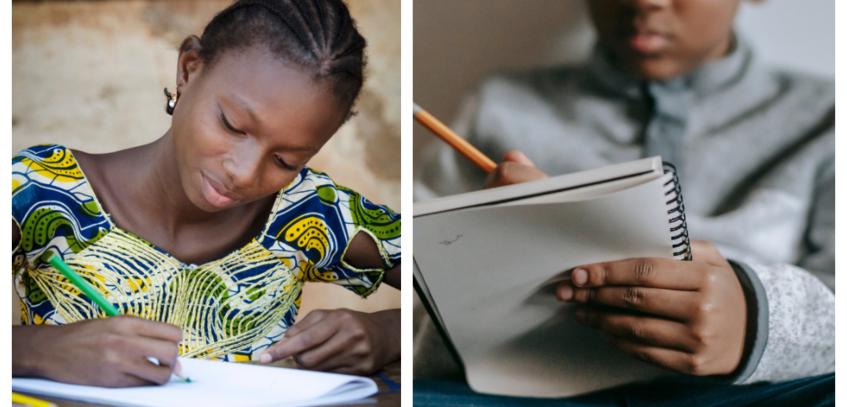The 2022 Young Africans Writing Contest
Today, millions of children are on the move, both within and across borders, with or without their parents or guardians. As a consequence, children contribute and are part of large-scale population movements that are currently taking place in many parts of the world. Migration and mobility research, as well as statistics shared by organisations such as Save the Children, have revealed that a variety of factors influence children's movements. When these children are on the move, they are exposed to harsh situations and are at greater risk to experience inadequate care, economic or sexual exploitation, abuse and neglect, whether voluntary or involuntary, within or between countries, and with or without their parents or other primary caregivers.
Against this backdrop, this year's theme is Children and Migration, specifically Children on the Move, and its connection to the AU's Free Movement Protocol (FMP), which was created with the goal of lowering, and eventually eliminating, barriers to Africans crossing regional borders to visit, trade, live, work, and establish businesses in other countries on the continent.
The writing competition will be the first of its kind on the continent for the second edition, allowing young Africans to reflect on the weightiness of children and migration issues on the continent, ultimately defining the role of children and ECOSOCC in promoting free movement of people and contributing to policy implementation. This year, ECOSOCC is looking for innovative ideas and sustainable solutions on how to strengthen and popularise the FMP through the eyes of our future leaders.
Essay Topic
"A Day in the Life of a Migrant Child."
Essay Instructions & Specifications
A downloadable template will be made available for participants to use as a reference.
1. Essays must be typed in Microsoft Word (version 2003 or higher) and submitted on A4 paper in MS Word format.
2. All entries must include a cover page containing the following basic information:
- Full Name
- Country
- Name of the educational institution
- Year/grade level
3. Entrants should use a 12-point font (preferably Times New Roman or Arial) and number their pages sequentially.
4. The essay should be no longer than 1000 words. There is no word limit, but essays of less than 500 words are discouraged.
5. Languages: Entries can be submitted in any of the official languages of the African Union (AU), including Swahili, English, French, Arabic, Spanish, and Portuguese.
6. All contestants must submit a completed and signed version of the participation form, which can be downloaded here. Please however fill out the participation form completely with your personal information in English or French.
7. Participants are encouraged to keep a copy of their essays for their own records because they will not be returned. Submissions must not contain obscene, violent, racist, religiously intolerant, or defamatory content.
8. Only original essays will be accepted for the contest. As a result, essays that have previously been published are not permitted. Any form of plagiarism will result in the essay being disqualified immediately and winning essays may be subject to additional verification of their originality.
9. Please note that the jury panel's decisions are final. Incomplete entries or entries that do not meet the formal specifications will be automatically disqualified.
Criteria for Assessment
Essays will be evaluated based on their ability to engage readers, thoughtfulness, and rhetorical effectiveness. The clarity and coherence of the essays will be more important than the quality of the language.
- Content Originality 50%
- Relevance in terms of the continent’s development 30%
- Structure 10%
- Overall impression 10%
Submission of Entries
All entries must be submitted electronically to the email address essay.yawc22@auecosocc.org. The essay and participation form should be attached in MS Word format, and only ONE entry per participant will be accepted.
Participants will receive an acknowledgement email within one week of submitting their application. If no acknowledgement is received, participants are requested to write to the organisers with proof of submission.
Eligibility
The participant must meet all the criteria below:
- Citizen and resident of an AU Member State;
- Registered student in a secondary (high school) educational institution in an AU Member State;
- 12 - 20 years old;
- Can read, speak, and write in any of the official languages of the African Union (AU) - Arabic, English, French, Portuguese, Spanish, and Kiswahili.
Entry Dates, Deadlines & Announcement of Winners
- This contest begins on July 16, 2022
- Contest ends on September 16, 2022 at midnight.
- The winners will be announced at an Awards Ceremony in November 2022.
- The Prize Giving Ceremony Modalities will be communicated to the participants in due course.
Prizes
All participants will receive a digital participation certificate. The best entries in each of the six official AU languages will be rewarded as below:
- The Winner of the Overall Best Essay (amongst the 18 best entries all languages combined) will be rewarded with the ‘Outstanding YAWC 22 Achiever Plaque’ and a sponsored visit to the ECOSOCC Headquarters in Lusaka, Zambia.
- The Top 3 winners in each linguistic category will be provided short virtual and/or physical training opportunities, possibly at the African Union in Addis Ababa, Ethiopia or in another AU Member State
- The Top 18 essays will be published in a special booklet entitled ‘My Africa My Future,’ Volume 2.
- List of Prizes will be officially communicated on the ECOSOCC website and to all entrants/participants electronically.
Right of Publication
All essay submissions will become the property of ECOSOCC. Winners' names, photographs, and essay content may be published in print and/or electronic media at the sole discretion of ECOSOCC.
Jury Panel
An independent panel of judges will evaluate and score essay submissions. The panel will choose the top 3 submissions in each language, as well as the overall best essay.


